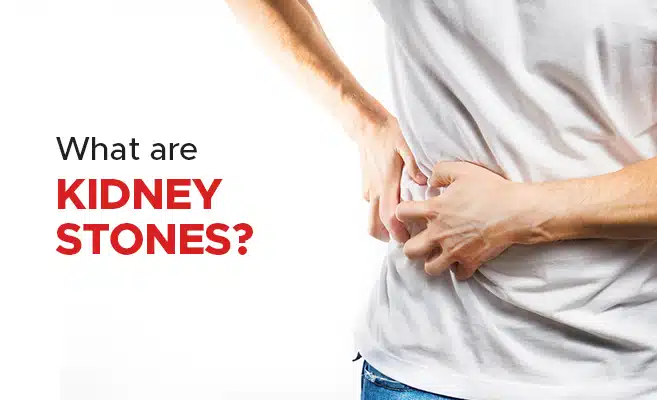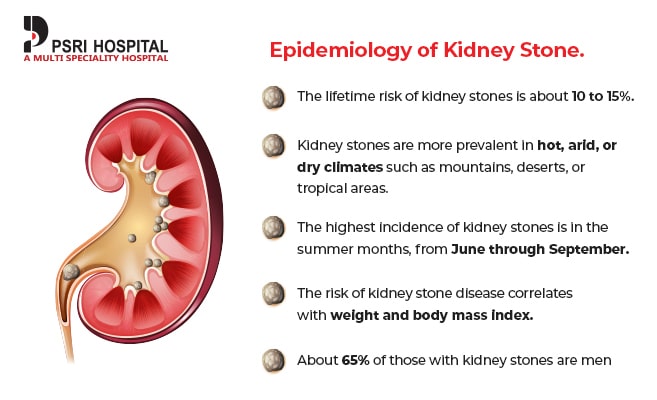What are Kidney Stones?

If you’ve ever experienced the excruciating pain of kidney stones, you know how unbearable it can be. Kidney stones are small, hard kidney deposits causing severe pain and discomfort. They can vary in size and shape, ranging from as small as a grain of sand to as large as a golf ball. Kidney stones are a common urological condition affecting millions of people every year.
In this blog, we’ve discussed kidney stone causes, treatment options, and even surgical procedures that may be necessary to remove stones. So, if you’ve ever wondered what kidney stones are or how they can be treated, read on to discover everything you need to know.
What is a Kidney Stone?
A kidney stone is a piece of solid material that forms in the kidney when minerals in the urine become very concentrated. Small stones often pass through the body with little discomfort, but larger stones can be very painful and even block the urinary tract. Kidney stones are more common in adults but can also occur in children of any age.
Epidemiology of Kidney Stone

What are the Most Common Kidney Stone Causes?
- Dehydration from low fluid intake is a major kidney stone cause.
- A high dietary intake of animal protein, pickles, salt, refined sugars, and colas and a diet rich in oxalates also increases your body’s risk of kidney stone formation.
- A person with a family history of kidney stones may be more likely to develop stones. Urinary tract infections, kidney disorders such as cystic kidney diseases, and certain metabolic disorders such as hyperparathyroidism are also linked to stone formation.
- Kidney stones are more common in people with Crohn’s disease. A person with recurrent kidney stones may be screened for such disorders.
What are the Kidney Stones Symptoms?
Now after knowing about some common kidney disease causes, you might be curious to know about its symptoms. Here are some major signs that you may experience:
- Waves of sharp pain start in your back and side and move toward the groin or testicles.
- Inability to find a comfortable position; people with kidney stone pain often pace up and down.
- Nausea and vomiting with ongoing pain.
- Blood in the urine.
- The frequent urge to urinate.
- Foul-smelling urine, fever with chills.
If you or your loved one are undergoing any of these kidney stone symptoms, getting the best advice and treatment from the best kidney specialist in Delhi is necessary. PSRI has the best team of specialists to help you detect your health problem and provide the best possible solution.
What is the Treatment for Kidney Stone Disease?
Most kidney stone treatments for small stones can be performed as same-day surgery, allowing you greater flexibility and a rapid return to work and other daily activities.
There are three main techniques for kidney stone surgery. The choice of treatment or procedure depends upon multiple factors, including the size and type of stone, medications you may be taking, other medical problems, and patient preference. Choosing the right and best kidney hospital in Delhi NCR is necessary for getting the best treatment for your kidney problems.
Ureteroscopy and laser lithotripsy (URS)
Ureteroscopy is typically performed as a same-day procedure under anesthesia. During the procedure, a small scope is passed through the urinary opening into the bladder and, from there, up into the ureter (the small tube that drains urine from the kidney to the bladder).
Once the stones are located, they are targeted with a laser that breaks them into smaller pieces, extracted, or into tiny pieces of dust that wash out of the kidney with normal urine flow.
Retrograde Intrarenal Surgery (RIRS)
RIRS is a boon for patients with kidney stones. RIRS is the procedure for doing surgery within the kidney using a viewing tube called a fiberoptic endoscope. In RIRS, the scope is placed through the urethra (the urinary opening) into the bladder and then through the ureter into the urine-collecting part of the kidney.
The scope thus is moved retrograde (up the urinary tract system) to a position within the kidney (intrarenal). The technique allows kidney specialists in Delhi NCR to perform surgery inside the kidney without making any incisions.
In RIRS, the stone is seen through the scope and can then be evaporated by a holmium laser probe or grabbed by small forceps. The procedure is usually done under general or spinal anesthesia. The advantages of RIRS over open kidney stone surgery include the following:
- A quicker solution to the problem.
- The elimination of prolonged pain after surgery.
- Much faster recovery.
By RIRS, doctors can remove 100% of stones less than 1.5cm in size, making the procedure almost painless with far less complication and morbidity.
Percutaneous Nephrolithotomy (PCNL)
PCNL involves keyhole kidney stone surgery through a 1 cm incision in the skin overlying the kidney. Removing kidney stones of more than 2 cm in size is most suitable for this type of surgery.
How Can kidney Stones be Prevented?
Recurrence rates are estimated at 50% over a 10-year and 75% over 20 years, with some people experiencing ten or more episodes throughout a lifetime. In those who previously had stones, there are many home remedies for kidney stones. Drinking lots of fluids results in more than two liters of urine passing daily. As per the stone analysis and 24-hour urine analysis report, dietary advice is given to you.
Conclusion
In conclusion, kidney stones can be a hurting and painful experience for those who suffer from them. However, by understanding the causes, symptoms, and treatments, we can take proactive steps to control them from forming in the first place.
If you still need any advice or seeking the best kidney stone treatment for your or your loved ones, contact PSRI Hospital. We are here as the best hospital for stone surgery in Delhi to help you out in every manner we can. So book an appointment now to get more information.
FAQs
Q. 1 What are some foods that cause kidney stones?
Ans: Foods high in oxalate, such as spinach, rhubarb, nuts, and chocolate, can increase the risk of kidney stones. Diets high in salt and animal protein can also contribute to their formation.
Q. 2 Can kidney stones cause gastrointestinal problems?
Ans: Yes, kidney stones can cause gastrointestinal problems such as nausea, vomiting, and abdominal discomfort. This can be due to the blockage of urine flow, leading to a buildup of pressure in the urinary tract and affecting the digestive system.
Q. 3 How painful are kidney stones?
Ans: Kidney stones can cause severe pain; some people describe it as one of the worst feelings they have ever. The back, side, and groin areas are all possible places for the wave-like pain. Fever, chills, and blood in the urine are some more signs that can appear.
Q. 4 Does coffee cause kidney stones?
Ans: Coffee has not been linked to an increased risk of kidney stones when consumed in moderation. Some studies have indicated that coffee may decrease the risk of developing kidney stones. However, extreme caffeine intake can contribute to dehydration, raising the risk of stone formation.

 Book An Appointment
Book An Appointment Virtual Consultation
Virtual Consultation





